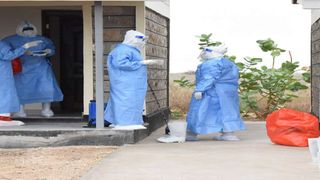
Public Health officers in personal protective equipment to prevent the spread of Covid-19, at Kanamkemer Sub-County Hospital in Lodwar town, Turkana County in the picture taken on July 28, 2020. This is one of the county's Covid-19 isolation centres.
| Jared Nyataya | Nation Media GroupNews
Premium
Plight of UHC county medics deployed in Covid isolation centres
What you need to know:
- Some medics told the Nation that they have opted to abandon the work because they cannot sustain their families.
- Some of the county isolation centres have run out of drugs, patients are now being forced to have their relatives buy from outside.
Many of the 200 medical doctors deployed to counties five months ago under the Universal Health Coverage (UHC) programme have downed their tools for private ventures.
They say they have been neglected, are hungry, broke, walk to work while some are bed-ridden fighting to stay alive after contracting coronavirus while on duty.
An investigation by the Nation reveals that most of these frontline doctors across the 47 counties, save for Makueni and Kakamega counties, lack personal protective equipment (PPE) despite working round the clock in major isolation centres.
Some of them told the Nation that they have opted to abandon the work because they cannot sustain their families.
“There are two factions of doctors: the county and the UHC doctors,” a doctor from Rift Valley who did not wish to be mentioned told the Nation.
“I tested positive for Covid-19, I can’t even afford to treat myself,” Dr X told the Nation.
He is one of the 200 deployed to counties under the UHC programme. He says the medics are mostly overworked but are yet to receive any penny.
“We reached out to the Ministry of Health but our efforts were futile and now the human resource department says they do not want us here.”
The Nation also learnt that some of the county isolation centres have run out of drugs, patients are now being forced to have their relatives buy from outside so that they can be treated.
“Only a few centres have critical care capacity while the rest are getting overwhelmed.”
Dr X says he also suffers from a severely mangled circadian rhythm for sleeping in the car too frequently.
“Doing government’s bidding at the frontline yet I can’t afford pampers for my daughter breaks my heart, sometimes I wonder how my wife looks at me.”
Health insurance scheme
In 2018, Kenya adopted UHC as one of its Big Four agenda priorities.
President Uhuru Kenyatta stated that his aspiration was to ensure people in Kenya are able to use the essential services they need for their health and wellbeing through a single unified benefit package minus the risk of a financial catastrophe by 2022.
This was to be done in pursuance of the human right to health as guided by the 58th World Health Organisation (WHO) World Health Assembly held in 2005 which urged member countries to aim to provide universally accessible health care to all members of the population based on the principles of equity and solidarity.
The human right to health as enshrined in Kenya’s Constitution 2010 is part of the development agenda outlined in Vision 2030.
The model adopted is a two-phase medium-term approach which, in the first phase, is expected to abolish all user fees at the primary level (local health care facilities) and the secondary level (county referral) hospitals.
The second phase is the rollout of a social health insurance scheme.
Funding comes primarily from the central government budget which, from the word go, set aside between Sh4.4 and Sh4.9 billion ($40 and $45 million ) for UHC.
The government considered various sources of funding like taxes and reallocation of funding from other budget areas.
Kenya also sources funding for certain elements of the health system like monitoring and evaluation from partner organisations.
Grim picture
In the county isolation centres, the picture at the frontline is quite grim. It is all about starting another never-ending shift of tending to patients whose lungs are doing everything to frustrate their will to live.
“I left my previous position in a private facility to join the UHC employment pool in August. Yet, since then I haven’t received a salary,” a doctor under the UHC in central Kenya said.
Dr Andrew Mulwa, County Executive Committee (CEC) member for Makueni County, however, argues that the national government has never paid anyone earlier than five to six months.
He believes this to be a structural problem that has existed since he joined 12 years ago.
“It takes six months for anyone to get on the government payroll.”
He also told the Nation that his county, unlike many, has a form of compensation and a comprehensive insurance cover in place to cushion doctors as they battle the coronavirus pandemic.
“If you have no PPE, you have no reason to show up at work,” he added.
The acting Secretary-General of the Kenya Medical Practitioners, Pharmacists and Dentists Union (KMPDU).
Chibanzi Mwachonda asked the government to pay and equip the doctors without hesitation.
“It is very unfortunate that these medics are yet to be paid and do not have medical cover,” he said.




